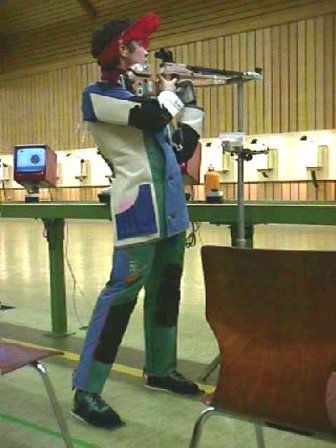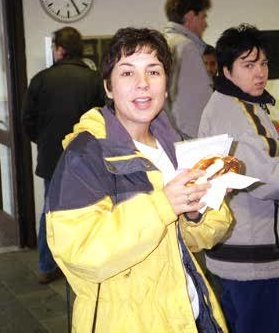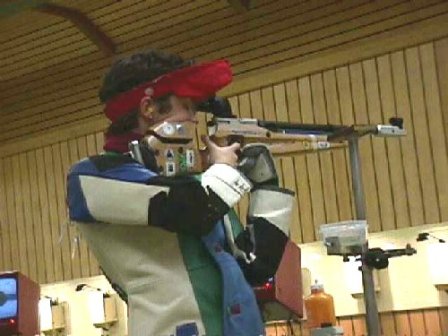INTERVIEW WITH NANCY JOHNSON
We spoke with Nancy Johnson of the US Rifle Team at the March 2000 airgun matches in Munich. She shoots a FWB P70 and won Gold at the 2000 Sydney Olympic Games in Women’s Air Rifle, pulling back a two-point deficit in a thrilling final, and winning by 0.2 on the last shot.
How did you start shooting?
I started shooting out of interest in archery and there wasn’t an archery range close enough for me to shoot at. My dad didn’t want me traveling the distance to go to one, and there was a rifle club three blocks away from my house, so he said, “Why don’t you try this?”, and I’m like, “Yuk, I don’t want to do that!” So I put it off for a while, then he talked me into it and I started.
How old were you when you started?
I had just turned fifteen.
So I guess the first time I saw you up at Camp Perry you hadn’t been shooting long because you were just like sixteen or seventeen?
Yes, I was sixteen my first year at Perry.
That was what, 1988 or 1989, something like that?
It would have been 1989, 1990, yes so it was my first year out there.
Were you one of Patty’s girls?
No, Obie Elision, out of Downers Grove Park, he was my coach.
Who was the greatest influence on your shooting?
Probably my coach, because when I first started I didn’t really know a lot of the well rounded international shooters or anything, and he’d been coaching for so long by the time he quit. I think it was 47 years that he’d been coaching so he was probably my biggest influence because he pushed me really hard and I just didn’t have anybody else. It wasn’t until I started going to Perry and started recognizing names and seeing who the good shooters were, so I really didn’t have an influence until years later. But he was my biggest one.
What is your most variable practice drill?
Shooting matches, and lots of them. It doesn’t matter if I go to a match or if I’m shooting a match by myself at the range, it’s shooting matches and not saying, “Oh well, this is just for me and it doesn’t count.” Shooting matches.
And that’s shooting physically and not dry firing?
Yes, and it could be a 40 shot match or a 60 shot match or a three position 60 shot match, but that really gets me in the habit of shooting a match and not making any difference. You know, differentiating between training and matches. If they are all matches it becomes very natural to shoot them, although Dan (Durban, US Team Rifle coach) thinks I should shoot more of them. I think I shoot plenty of them.
This is sort of a personal question and sort of a business question for me, but I guess you have been shooting matches on the RIKA home trainer?
Yes, I’ll do that some. We usually use that mostly on the weekends because we have access to the range during the week. But I can tell you a number of times they have had a training holiday at Fort Benning, so nobody trains, and to drag him (Ken Johnson, her husband, a member of US Army’s Marksmanship Unit) in is like pulling teeth. So I’ll just use that or shoot a match on paper targets at home, but that comes in handy big time especially when you do want to train and you can’t go in to use the range.
How do you handle the mental game?
Let’s see. Okay. How do I handle it? I would say more times than not, if I have a bad shot, I just get angry and almost like kill the next one. And it usually works I would say 9 times out of 10. And I have actually talked to some other coaches about this, because they’re like, we need to find what works for you and if being aggressive and being more on the attack helps in getting a little bit fired up, then great. If that works, then do it, and I have actually talked to Sergey (Luzov the RT coach for the US) about it quite a bit.
Really?
Yeah. And he says if that works, then fine. And I don’t know if you would say it was anger or aggression or a little bit of both. You know you do get a little bit irritated with yourself if you have a stupid shot and if you jump on the next one and say, “Okay, the next one is going to be a ten, and it’s going to be a deep ten, and I don’t care and I’m not going to take anything less”, it usually works. And I guess some people would correlate anger with negativity but it’s not that. You have to stay positive no matter what, and there’s a point that Bill Pullum makes in his book actually about treating each shot as an individual match instead of treating forty shots as a whole match. That works really well too. Just take it one shot at a time. And I know kids hear that, juniors hear that all the time, one shot at a time, one shot at a time but it really it’s true. I mean, one shot you treat like you have forty little matches instead of one forty shot match. It makes all the difference in the world. It’s easier to just forget about a not so good shot.
How do you know when to sit down or step back away from the rifle a little bit?
When you shoot a shot and if it’s not where you think you called it, or even if you just have a shaky shot. When things just start not going right you should actually recognize it before it starts feeling bad, and sometimes I know that’s a big problem for a lot of people, including me. It’s only been like in the last year and a half I can sit down before I shoot a bad shot and it’s just if your position feels a little funny, you’re forcing shots, or if you know shots are way out but still tense or just barely there then it’s time, time to take a break. And I think especially with juniors they need to know that it’s okay to take a break, and it’s okay to get out of position. A lot of them are afraid to sit down and break their position. You should be able to make it so natural that you can just get out, and sit down and walk away from it, and there’s nothing wrong with that.
Okay, I asked Ken this. Do you have a charm or mascot or something that you put up on the line or something that you wear that to you has a particular meaning?
Hmmm. No, I think I used to be pretty superstitious about certain things, but I’m really not anymore. As long as I have everything is in order and I have my things as far as the match goes, shooting I’m fine. But I really don’t.
Is setting up your gear on the line in a particular method part of your mental focus on the match?
Yes, it is. I know that I lay thing out in a certain order, but I probably couldn’t write it down on a piece of paper and tell you. But I do I tend to, and especially in Air. I pull my stand out first, then my glove, then my hat, and make sure that’s all laid out, because it really stinks when you get up there and, “Ahh I forgot something”. And so I’m really particular about that, but I don’t have any charm or anything to put up with my gear. Ken is my good luck charm. Even if he isn’t there I know he’s around, whether it be shooting or in another range or..
Somewhat along the line same lines as far as the mental thing, do you have something particular that you think about during the match, to kind of get your mind off shooting a little bit but that you can still concentrate on shooting? Do you understand what I am saying?
I told Ken, the other day, I said it’s taken me year to be able to think about nothing, while you’re taking just a mental break. But especially within the last, I’d say 6 to 8 months or so, it’s been very easy for me to take just a few shots and then just stand there, and then you’ll look at me and you’re like, “What is she doing?”. Because I’ll just BE and I won’t be thinking about anything, and it’s hard to think about nothing. It’s very, very hard. But I have actually, I can say, mastered that task. Some people think about something, you know they think about a great date that they had, or a great movie that they saw, or something. I just will not think about anything. And it’s almost like it’s not hard to do it anymore. I used to have to force myself to go, okay, nothing, nothing, nothing, nothing and then all of a sudden a thought of some where could come in. Now I can just focus and not think about anything. So, yeah, I guess I do that a lot.
It’s good you can do that.
It was hard, but it’s not hard anymore.
 So, I guess I won’t ask you what you don’t think about during the match? Since you can pretty well space?
So, I guess I won’t ask you what you don’t think about during the match? Since you can pretty well space?
I don’t think about failing. Because you think about failing and you’re going to fail. And I know that you have probably heard that from millions of people, but I think it was Lannie Basham in his book and in his tapes said be careful what you think about. And he even talked about if someone next to you shoots a 9 and you happen to look at their screen, get that thought out of your mind immediately. Even if it was just a fleeing, oh, that person shoot a 9, don’t think about that 9 because, dang it, if you don’t just shoot one on your next shot! So you really… It really sounds funny, but be careful what you think about. I know he says that in his tapes and I think it’s in his books too. So, you just have to think positive. If you shoot a 9 don’t think about the possibility of shooting another 9. Think about shooting a 10.
How do you prepare for a match at the beginning of the season, January through March, as opposed to later in the year? Particularly with the Olympic tryouts coming up?
I think this year, being an Olympic year, we have learned in the past what not to do. Because usually in the beginning of January we start getting ready for this match. And that’s just too late. Yes, everybody needs a break at the end of the year. November, December there’s a lot of holidays, nobody wants to shoot. But we actually shot all through the end of last year. And I think that’s a key to getting a jump over here, so that we come here, and in the past pretty much you know, far to the middle of the pack, and we just kept on shooting through the fall and the winter, and you know we took a break maybe for Christmas, but that was really it. So this year was the year not to take a break. I think breaks are important, but I think it was really important to keep shooting through the fall. So we were a lot more ready for this match and the matches we shoot in January.
Do you train with weighs or anything?
Yes. I’m a huge runner, huge weight lifter, not heavy weighs necessarily but I’m big into weight lifting & weight training, that kind of thing.
You’re more into the repetition weight rather than trying for large..
Yes, I mean, I used to be into the big bulk thing, and that’s why my legs look like those of a cyclist instead of a shooter’s, but I think there is a point to where too much is not a good thing. I think I try to lower my center of gravity by doing a lot of legs. I don’t do a ton of upper body but I do a lot of legs, and I think it really just helps keep me stable. I look at shooters like Glen Dubbis who are short and stocky, and I think that helps, there’s a lot less in back bending involved in his shooting, its just kind of, he’s a rock, and I think it helps a lot. I don’t think anybody should get too big in their upper body, because you start stressing your muscles too much and you’ll have muscle spasms during your shooting. But I have done a lot of investigating on it because we had weight trainers through college who I think had us on the wrong track.
You went to Murray State, is that right?
University of Kentucky.
Oh, ok.
And I think the ones at UK were the basketball trainers, and they really wanted nothing to do with the shooters any way, and they were having us lift till failure. Which you know, you could be doing twenty five reps of a really heavy weight and get done and not be able to walk. Once I got to the OTC they knew more about the physical aspects of shooting, and knew which muscles were more important to have trained and geared us a program around that. And heavy, I mean it was a gradual building, but it wasn’t, you know, you won’t kill yourself. So I still do that, lots of running, lots of cycling, that kind of thing.
Are you still working at Home Depot as part of their Olympic Athlete program?
Not any more. I quit. Actually, I took a leave of absence as of January 3rd, I really hadn’t worked that much since Thanksgiving. It’s just time not to work anymore. Especially with the job I had, on my feet all the time, sore feet, sore knees, sore back, all the time, and it just wasn’t right. It was time to go, the Olympics are so close. The program was great for me while I needed it, but now is just the time not to think about anything but shooting. So I took a leave, but I don’t like working ——-, I don’t think I’ll go back.
Well you know , When you’ve won a gold medal in Sydney, you’re going to come back and get that huge million dollar advertising contract that shooting is so full of.
Yeah right, right, right.
What one thing do you wish you could have learned early in your shooting career?
Not to worry about what other people are doing. Because this is a very individual sport. Yet especially as juniors, who wants to know how everybody else is doing? And I think that goes on a lot, no matter what age you are, but at some time you have to learn you are doing this for yourself, by yourself. You’re shooting for yourself, no one else is pulling the trigger and who cares what Tom, Dick or Harry are doing down the line?
Here’s a question, that’s out of the blue since you mentioned that though. There have been a couple of people that have been kind of advocating, that every year they take a aggregate of all the matches and rank all the US shooters, what would you think about that?
It wouldn’t bother me any, I think there are maybe some shooters who would support that for ranking purposes, like for picking the national team or for something like that.
Yes, and just something or you could have something to compare, well going back to comparing themselves to others, saying hey, I used to be 20th in the nation and now I’m 17th or something.
I think honestly for younger kids, like juniors it might be nice, because they could actually see progress instead of making the development team one year and not making the development team next year. So many of our competitions now are international competitions, and that’s how we’re pretty much ranked now. It would be, you know, our nationals usually decide our ranking, I guess. But I can see how over the course of the year, even if it is internationals and nationals matches, and just take everything and throw it in a pot, it wouldn’t bother me any. I think some shooters would be sorely surprised as to where they ended up, and go “I wish they hadn’t come out with that ranking”, but I would be fine with it.
